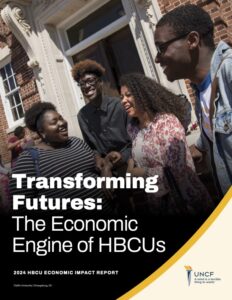 The United Negro College Fund (UNCF) released a new report that highlights the positive financial impact HBCUs have on the United States economy, solidifying their importance in shaping America’s future workforce.
The United Negro College Fund (UNCF) released a new report that highlights the positive financial impact HBCUs have on the United States economy, solidifying their importance in shaping America’s future workforce.
According to the UNCF’s analysis, the total impact of HBCU spending generates $16.5 billion in annual spending across communities throughout the country. This results in about an additional 43 cents added to the regional economy for every one dollar spent. In terms of their job creation, HBCUs’ contributions are roughly equivalent to that of a large publicly traded American company. Across the country, HBCUs generate over 136,000 jobs, more than the number of jobs at Dell or Intel.
Most notably, students who graduate from HBCUs earn significantly more money over the course of their lifetime compared to what they would earn without their HBCU education. The report found HBCU graduates will earn about 57 percent more throughout their lifetime than they would have without a degree or certificate. Put differently, an HBCU graduate who works full-time could expect to earn over $1 million in additional income as a result of obtaining an HBCU degree.
Despite the numerous benefits HBCUs provide to the United States economy, they remain historically underfunded. Over the past four years, the federal government has made significant contributions to HBCUs, however the financial hardships due to the COVID-19 pandemic still pose significant challenges to their stability.
The authors conclude their report with the following statement:
“The results are clear: We must invest more in HBCUs to support their growth, resilience and innovation – and to continue to grow our national, state and regional economies. HBCU students, alumni, families, and communities across the country must come together to raise their voices in support of HBCUs. We must demand support for HBCUs at legislative sessions, town halls and at the ballot box. Together, we can hold our country’s leaders accountable and demand true equity in education.”
The report was created by scholars from the UNCF Frederick D. Patterson Research Institute in collaboration with the University of Georgia.

